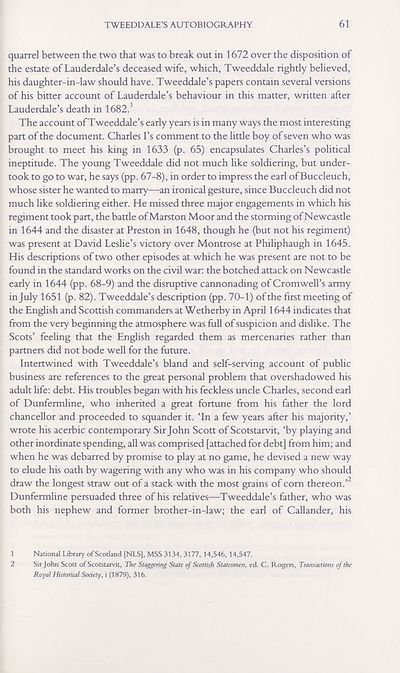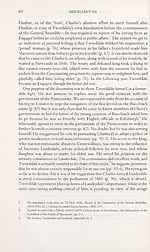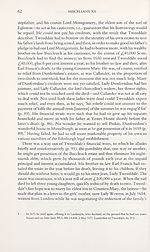Series 5 > Miscellany of the Scottish History Society, Volume 12
(72) Page 61
Download files
Complete book:
Individual page:
Thumbnail gallery: Grid view | List view

TWEEDDALE’S AUTOBIOGRAPHY
61
quarrel between the two that was to break out in 1672 over the disposition of
the estate of Lauderdale’s deceased wife, which, Tweeddale rightly believed,
his daughter-in-law should have. Tweeddale’s papers contain several versions
of his bitter account of Lauderdale’s behaviour in this matter, written after
Lauderdale’s death in 1682.1
The account of Tweeddale’s early years is in many ways the most interesting
part of the document. Charles I’s comment to the little boy of seven who was
brought to meet his king in 1633 (p. 65) encapsulates Charles’s political
ineptitude. The young Tweeddale did not much like soldiering, but under¬
took to go to war, he says (pp. 67-8), in order to impress the earl ofBuccleuch,
whose sister he wanted to marry—an ironical gesture, since Buccleuch did not
much like soldiering either. He missed three major engagements in which his
regiment took part, the battle of Marston Moor and the storming of Newcastle
in 1644 and the disaster at Preston in 1648, though he (but not his regiment)
was present at David Leslie’s victory over Montrose at Philiphaugh in 1645.
His descriptions of two other episodes at which he was present are not to be
found in the standard works on the civil war: the botched attack on Newcastle
early in 1644 (pp. 68-9) and the disruptive cannonading of Cromwell’s army
in July 1651 (p. 82). Tweeddale’s description (pp. 70-1) of the first meeting of
the English and Scottish commanders at Wetherby in April 1644 indicates that
from the very beginning the atmosphere was full of suspicion and dislike. The
Scots’ feeling that the English regarded them as mercenaries rather than
partners did not bode well for the future.
Intertwined with Tweeddale’s bland and self-serving account of public
business are references to the great personal problem that overshadowed his
adult life: debt. His troubles began with his feckless uncle Charles, second earl
of Dunfermline, who inherited a great fortune from his father the lord
chancellor and proceeded to squander it. ‘In a few years after his majority,’
wrote his acerbic contemporary Sir John Scott of Scotstarvit, ‘by playing and
other inordinate spending, all was comprised [attached for debt] from him; and
when he was debarred by promise to play at no game, he devised a new way
to elude his oath by wagering with any who was in his company who should
draw the longest straw out of a stack with the most grains of com thereon.’2
Dunfermline persuaded three of his relatives—Tweeddale’s father, who was
both his nephew and former brother-in-law; the earl of Callander, his
National Library ofScotland [NLS], MSS 3134, 3177,14,546, 14,547.
Sir John Scott of Scotstarvit, The Staggering State of Scottish Statesmen, ed. C. Rogers, Transactions of the
Royal Historical Society, i (1879), 316.
61
quarrel between the two that was to break out in 1672 over the disposition of
the estate of Lauderdale’s deceased wife, which, Tweeddale rightly believed,
his daughter-in-law should have. Tweeddale’s papers contain several versions
of his bitter account of Lauderdale’s behaviour in this matter, written after
Lauderdale’s death in 1682.1
The account of Tweeddale’s early years is in many ways the most interesting
part of the document. Charles I’s comment to the little boy of seven who was
brought to meet his king in 1633 (p. 65) encapsulates Charles’s political
ineptitude. The young Tweeddale did not much like soldiering, but under¬
took to go to war, he says (pp. 67-8), in order to impress the earl ofBuccleuch,
whose sister he wanted to marry—an ironical gesture, since Buccleuch did not
much like soldiering either. He missed three major engagements in which his
regiment took part, the battle of Marston Moor and the storming of Newcastle
in 1644 and the disaster at Preston in 1648, though he (but not his regiment)
was present at David Leslie’s victory over Montrose at Philiphaugh in 1645.
His descriptions of two other episodes at which he was present are not to be
found in the standard works on the civil war: the botched attack on Newcastle
early in 1644 (pp. 68-9) and the disruptive cannonading of Cromwell’s army
in July 1651 (p. 82). Tweeddale’s description (pp. 70-1) of the first meeting of
the English and Scottish commanders at Wetherby in April 1644 indicates that
from the very beginning the atmosphere was full of suspicion and dislike. The
Scots’ feeling that the English regarded them as mercenaries rather than
partners did not bode well for the future.
Intertwined with Tweeddale’s bland and self-serving account of public
business are references to the great personal problem that overshadowed his
adult life: debt. His troubles began with his feckless uncle Charles, second earl
of Dunfermline, who inherited a great fortune from his father the lord
chancellor and proceeded to squander it. ‘In a few years after his majority,’
wrote his acerbic contemporary Sir John Scott of Scotstarvit, ‘by playing and
other inordinate spending, all was comprised [attached for debt] from him; and
when he was debarred by promise to play at no game, he devised a new way
to elude his oath by wagering with any who was in his company who should
draw the longest straw out of a stack with the most grains of com thereon.’2
Dunfermline persuaded three of his relatives—Tweeddale’s father, who was
both his nephew and former brother-in-law; the earl of Callander, his
National Library ofScotland [NLS], MSS 3134, 3177,14,546, 14,547.
Sir John Scott of Scotstarvit, The Staggering State of Scottish Statesmen, ed. C. Rogers, Transactions of the
Royal Historical Society, i (1879), 316.
Set display mode to:
![]() Universal Viewer |
Universal Viewer | ![]() Mirador |
Large image | Transcription
Mirador |
Large image | Transcription
Images and transcriptions on this page, including medium image downloads, may be used under the Creative Commons Attribution 4.0 International Licence unless otherwise stated. ![]()
| Scottish History Society volumes > Series 5 > Miscellany of the Scottish History Society, Volume 12 > (72) Page 61 |
|---|
| Permanent URL | https://digital.nls.uk/127339665 |
|---|
| Description | Over 180 volumes, published by the Scottish History Society, containing original sources on Scotland's history and people. With a wide range of subjects, the books collectively cover all periods from the 12th to 20th centuries, and reflect changing trends in Scottish history. Sources are accompanied by scholarly interpretation, references and bibliographies. Volumes are usually published annually, and more digitised volumes will be added as they become available. |
|---|


